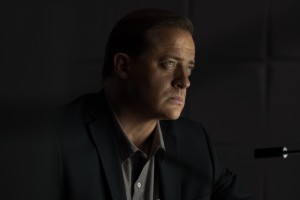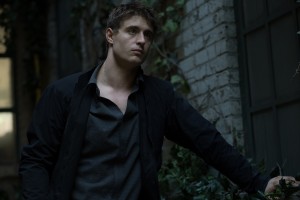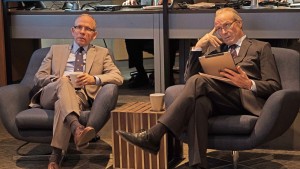CONDOR, AT&T Audience Network’s new Wednesday-night series, is based on the 1975 film THREE DAYS OF THE CONDOR starring Robert Redford, which in turn was based on James Grady’s novel SIX DAYS OF THE CONDOR. With the series, we get ten episodes of CONDOR, which stars Max Irons as Joe Turner, a young C.I.A. analyst who is horrified when everyone else in his office is murdered – and he is blamed for the mass killing. As Joe tries to clear his name and find out who is actually responsible, a major conspiracy goes to work against him.
Jason Smilovic and Todd Katzberg developed CONDOR for television together and serve as two of the series’ executive producers. Smilovic (pronounced SMILE-o-vik) previously developed/created the series KAREN SISCO, KIDNAPPED, which Katzberg also worked on, and MY OWN WORST ENEMY. The two men sit down for a discussion about their deep dive into the C.I.A. with CONDOR.
ASSIGNMENT X: Were you daunted or excited by the idea of how much technology has changed since the source material for CONDOR came out?
TODD KATZBERG: Well, technology is what gave us the portal to do the update, right? Because technology has changed so much since 1975 – it’s changed so much in the last decade – that so many stories that have already been told are now ripe for reexamination, because we can now look at those stories through the lens of technology. Also, all of the issues that were relevant during the movie, and the reaction in 1975, the Nixonian[-era] paranoid thriller, felt really relevant to what’s going on today in our own national discourse with distrust and paranoia and trying to get out from under the weight of tribalism and to embrace multiculturalism.
JASON SMILOVIC: For us, I think the really daunting thing was taking on such sacred material as THREE DAYS OF THE CONDOR, which is a movie that we both love. When we were first offered the job, our first instinct was absolutely to say no, that we wouldn’t go anywhere near material like that. It was only once we realized how ripe it was, not just for an update, but for an adaptation into the longer form of television, that we began to take the idea much more seriously.
KATZBERG: And there was a story that was going on beyond the frame of the movie, and we recognized that there were characters that the movie doesn’t have the bandwidth to really delve into. And so we wanted to take the broader canvas of television and be able to paint a bigger picture.
AX: How did you become involved with CONDOR?
SMILOVIC: Originally, [production company] Skydance came to us, and then we developed it with Skydance and MGM, and then we continued to develop it with Skydance, MGM and Audience.
AX: Had you been looking to do a series, or were you planning to do more features?
SMILOVIC: We’re always interested in both. For us, it’s really the idea that drives it, and as I said, if we had been asked to do a movie adaptation of THREE DAYS OF THE CONDOR, I’m sure that we would have said no. It was the fact that in the medium of television, and especially what it’s become in the last twenty years or so, gave us such an opportunity to explore those parts of the movie that a two-hour movie can’t possibly explore, that was really the appeal to us.
AX: How did you arrive at Max Irons to play your lead?
SMILOVIC: We saw a tape that he did, and we were just completely blown away. As soon as I saw his audition, I wrote an email to Todd, saying, “We found our Joe Turner.”
AX: I asked Bob Balaban about this, and he laughed and said no – did you intentionally make Bob Balaban as C.I. A. Director Reuel Abbott look like Jeff Sessions?
[Both men laugh.]
KATZBERG: That’s the first time it even occurred to me, but it’s a very astute point.
SMILOVIC: It’s really funny. No. I think if anything we dressed him based on the head of the Central Intelligence Agency in the ‘70s. Not Casey, the other one.
KATZBERG: The idea was certainly to give him the look and feel of old school C.I.A., somebody who’s been with the agency for a long time, and has that kind of blue-blood, traditional, conservative thing that has defined the Agency for so long.
AX: Does Abbott do what he does out of principle, or out of the fact that he’s said it, and therefore this is what shall be?
SMILOVIC: This is a character who’s blinded by fundamentalism and fanaticism. Recently, I read something where a hero was a work in progress, somebody who is constantly evolving, and a villain is somebody who knew exactly who they were. And so all of our characters occur somewhere along that spectrum between fluidity and concretization, and he is probably our most assured character in terms of, he has no doubt that he’s right.
KATZBERG: I think his character hopefully poses the question – if you were a person of really sincere religious faith, and you came to the conclusion that you were the center of God’s plan, how far would you be willing to go in order to pursue that conviction?
SMILOVIC: [Abbott] has a calm as the result of that belief, so the character never wavers through our story, never has a moment of doubt.
AX: Where is Joe Turner’s center? How much does he know about who he is, apart from the fact that he’s having a hard time getting dates?
SMILOVIC: The thing about Joe Turner is that he’s somebody who exists in this ivory tower of thought experiments, but also finds himself at a crisis point, and is considering leaving the C.I.A., and has an opportunity to make good on that declaration, and if he had, he would have sidestepped the quest entirely. Because he decided, despite his grievances, to stay in the C.I.A., he needs to go on a journey to find out that he is not the person that he thinks he is. And so we apply a lot of pressure to Joe Turner to reveal the true depths and nature of his character, [which may] surprise both the audience and himself.
KATZBERG: I think that we all, as human beings, get to live under the illusion that we know ourselves, and that our characters are somewhat fixed. It’s not too often in real life that we get presented with a challenge to those convictions, or we’re forced to really defend them in a real-world situation against a crisis. And that was our goal in the show with all the characters, but really with Joe in particular, was to take the character with a really strong moral compass and throw everything that we could at them to challenge that compass.
SMILOVIC: We’re in an age of extreme specialization, and almost everything that individuals had to do a hundred or two hundred years ago is now farmed out to specialists. Because we occupy this abstract reality, we’re able to be the beneficiaries of so much evil and wrongdoing, while espousing these benevolent beliefs. And so our hope is that people can learn to question themselves, and to be a little bit more uncertain of what they know and what they think they know.
KATZBERG: I think for us the biggest problem was trying to make Max convincing [as a] person having trouble getting dates [laughs].
AX: You establish pretty well that he wasn’t getting dates because he was actively avoiding getting dates …
SMILOVIC: He’s somebody who has a secret, and that secret is kind of the organizing principle of his life, it’s his cross to bear, it makes it impossible for him to connect with another person, and he’s somebody who lives in a state of constant doubt. That’s kind of his character’s defining trait, it’s both Joe Turner’s strength and his weakness. That doubt is what makes him very smart, and very inquisitive, but it also is paralyzing.
AX: One of the big things that everybody remembers about THREE DAYS OF THE CONDOR is the slaughter at the C.I. A. station house, which you have in Episode 1. Did you feel a desire to do it differently from the film?
SMILOVIC: One of the things that we did do a little bit differently is, in the movie, you never really get to spend a lot of time with the characters that Joe Turner works with. And so when they die, that happens so early in the film, you don’t really feel as much the loss of those characters, because you didn’t get a chance to know them too well. In our show, we wanted to get to know those characters in a way that people might assume that they were going to be a more significant part of the show, so that when they’re killed, we hope that people will feel a little more [sense of loss].
KATZBERG: And also just having the ten hours to tell our story allowed us really to use that event as a jumping-off point, and to have our Joe Turner not just running from a problem, but ultimately running towards the problem, and having to play offense as well as defense. So again, the long form of television is really what I think allowed us to craft something out of the pre-existing movie that was a little bit more our own.
AX: About how many big action set pieces are there per episode?
SMILOVIC: It’s hard to say how many there are per episode, or if there’s even a set piece in every episode. I think what was really important to us in crafting the set pieces was, rather than people being surprised by the action or the set piece, we wanted them to be surprised by the character choice that was the catalyst to that set piece. So we really wanted the set pieces to be turned by surprising moments of character.
KATZBERG: We love action, we love action movies. But for us, what we really get excited about is the nuanced and developed character. That’s really what we’ve tried to spend most of our time focusing on in this show.
AX: With this kind of material in particular, on the one hand, you always want to show, not tell, but there’s also the issue of the audience sometimes going, “What is it that you’re showing me?” So how do you get around not being exposition-heavy, but showing people things in a way where they can understand what’s happening?
KATZBERG: Hopefully we do, just really through revision. Our first passes of things are always exposition-heavy, and we always go over them a million times, and try to slowly turn that exposition into action.
SMILOVIC: I think if you introduce the characters first, you can acclimate the viewer to the characters and their nature, and to make them feel something for those characters and their relationships, I think that it makes it easier to then understand, if not explicitly, what is going on in some of the technical aspects of the plot. Because you’re seeing it through the lens of each of those characters who you’re now acclimated to, you can feel whether something is positive, whether something is negative, whether it’s dangerous, whether something just went wrong. And so I think it’s less important to be able to explicitly convey what’s going on in some of those scenes. I think it’s more important to couch them in the point of view of character, and to make sure that the audience understands that character’s appreciation of what’s happening.
AX: In taking the story to ten hours, can you talk about some of the subplots that you’re adding?
KATZBERG: There are a lot of characters who we essentially invented, thanks to the freedom that the ten hours gave us, and we tried to make all of those characters emerge organically out of the pre-existing relationships. One example is Mira [Sorvino]’s character, Marty Frost, who has a past with Bob Partridge [played by William Hurt], who becomes really important as the series goes on. Another example is a character named Sharla Shepard [played by Christina Marie Moses], the girlfriend of Joe’s friend at IP, Sarah Tan [played by Ellen Wong], who is obliquely referenced in the pilot episode before Sarah dies, but who will end up becoming a really important character, because she’s also a Federal agent. The idea with that was finding a character who, like Joe, had a personal interest. There’s a certain amount of interest that you can get from an investigator who’s doing her job and wants to solve the case, but there’s a little bit something more when your girlfriend, somebody who you love, was killed. You want to know the truth. And so we found an organic way in, where Bob Partridge was looking for somebody who had that same kind of personal sense of investment, to be his proxy in this investigation, that we were looking for from a dramatic point of view, and a character like Charlotte filled that void for us.
SMILOVIC: It was very important for us to make sure that each of our characters had a personal stake in what was going on, and that even though everybody’s reacting to the same inciting incidents, that everybody is intersecting with the plot at a very personal angle.
AX: What does Mira Sorvino’s character do for the way the story works?
SMILOVIC: She’s what’s called a graybeard. A graybeard is somebody who used to work in the intelligence community, who has since retired, and who is brought back in, in a moment of crisis, where a dispassionate entity is required. And so she is brought in to investigate something that has happened internally at the C.I.A., the liquidation of an entire C.I.A. outpost. And even though a graybeard is somebody who is supposed to be brought in for their dispassion, she is a character, because of her history with Bob Partridge, who is not able to remain dispassionate.
AX: Did you guys do any research into the medical aspects of the story? One major plot thread has to do with a disease …
SMILOVIC: The disease is absolutely a real disease, a plague, and these are ideas that come from real white papers within the intelligence community. The intelligence community conducts a lot of thought experiments, and they ask a lot of, “What if this person does this? What if this country does that? What would our response be? How would we defend against it? What would our offensive response be? What might we do to another country that presented itself as a threat?” It’s a hundred percent true that our country stockpiles superfloxin in order to prevent against the spread of the plague if we are ever attacked by that particular bioweapon.
AX: Do you have any other projects going on that we should know about?
SMILOVIC: We are currently adapting Robert Littell’s book THE SISTERS, which was a New York Times best-seller. It takes place in 1963, and it’s about the second gunman in the Kennedy assassination. That’ll be a feature film.
AX: And what would you most like people to know about CONDOR?
SMILOVIC: That it is on the Audience Network on Wednesdays.
KATZBERG: Hopefully, that it’s a really exciting spy thriller that also has some great character elements and even a little bit of thematic meat to it, and political relevance.
This interview was conducted during AT&T Audience Network’s portion of the Television Critics Association (TCA) press tour.
Related: CONDOR: Bob Balaban chats Season 1 of the new AT&T Audience Network thriller – Exclusive Interview
Follow us on Twitter at ASSIGNMENT X
Like us on Facebook at ASSIGNMENT X
Article Source: Assignment X
Article: CONDOR: Co-Creators Jason Smilovic and Todd Katzberg on Season 1 of the new AT&T Audience Network thriller – Exclusive Interview
Related Posts:














